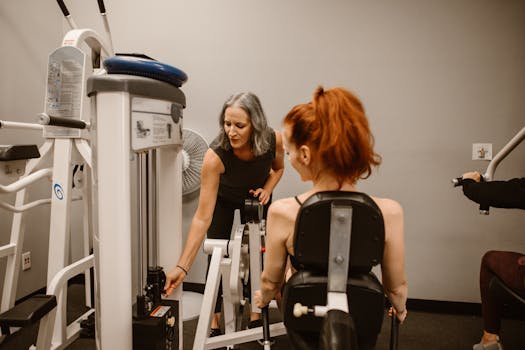You can do a recognised qualification in gym instructing or fitness instructing.
Entry requirements
There are no set entry requirements for this route.
A Physical Training Instructor, or PTI, is responsible for developing and delivering fitness programmes to individuals and groups. PTIs work in a variety of settings, including the armed forces, police, schools, sports clubs, and leisure centres. Their main duties include planning exercise routines, leading group fitness classes, providing guidance on physical health and nutrition, and assessing the physical ability of clients or trainees. In the military, PTIs play a crucial role in ensuring personnel are physically prepared for the demands of service. This career requires strong communication skills, a passion for fitness, and the ability to motivate others.

Physical Training Instructors in the UK typically earn between £20,000 and £30,000 per year, depending on experience and employment sector.
There are approximately 7,000 to 8,000 PTIs employed across the UK, with many working in the armed forces, police, and leisure sectors.
Most PTI roles require at least a Level 2 Certificate in Fitness Instruction or equivalent, and some positions, especially in the military, require additional training.
Works within the armed forces to design and lead physical training programmes for service personnel, focusing on improving fitness, strength, and teamwork.
Guides young athletes in specific sports such as football, rugby, or athletics, helping them develop their physical skills and teamwork through structured training sessions.

Assists individuals recovering from injuries or illnesses by creating and supervising tailored exercise plans to help them regain strength and mobility.
Focus on improving your own fitness levels by engaging in regular exercise and maintaining a healthy lifestyle.
Physical Training Instructors must lead by example. Participate in a variety of sports and physical activities such as running, swimming, team sports or circuit training. Understanding different types of exercise and gaining practical experience will help you later when instructing others. Consider tracking your progress using fitness apps or journals.
Take relevant subjects at school or college, such as Physical Education (PE), Biology, or Sports Science.
Strong knowledge of human biology, nutrition and exercise science is key for this role. GCSEs, including PE and science subjects, provide a good starting point. Post-16, consider A levels or BTECs in related fields for a deeper understanding and improved prospects.
Join sports teams or fitness clubs to gain experience working with others and develop leadership skills.
Being a PTI involves motivating and working with groups. Experience in team environments helps you learn about teamwork, leadership and communication. Volunteering to help coach or organise sports events can also give you an early taste of instructing others.
Obtain recognised fitness instructor or personal trainer qualifications.
Look for qualifications such as Level 2 Certificate in Fitness Instructing or Level 3 Diploma in Personal Training. These courses can be taken through colleges or private training providers and often include both theory and practical elements. They will prepare you for leading fitness sessions safely and effectively.
Complete a recognised first aid course, as safety is a key part of the PTI role.
Most employers require PTIs to be trained in first aid and CPR. Courses are available from organisations such as St John Ambulance or the Red Cross and usually take one or two days to complete. This skill is essential for responding to emergencies during physical training.
Search and apply for PTI positions in organisations such as the armed forces, emergency services, schools, gyms or sports centres.
PTIs are commonly employed by the British Army, Royal Air Force, and Royal Navy, but also work in civilian settings. Entry requirements vary: military PTIs may need to pass selection tests and basic training, while civilian employers focus on your qualifications and experience. Check job listings and recruitment websites regularly.
Develop your skills on the job and seek opportunities for further training or specialisation.
Once employed, you will continue to learn and may be able to specialise in areas such as rehabilitation, sports coaching, or advanced fitness assessment. Attending workshops, seminars and additional courses can help you progress to senior or specialist PTI roles.
Explore relevant apprenticeships that can help you kickstart your career in Physical Training Instructor (PTI). Apprenticeships offer hands-on experience and training while earning a wage.
This page showcases various career options and the pathways to reach them. Each career listed here shares transferable skills and knowledge, making it easier for individuals to transition between them.
Your current career is highlighted to help you see how it fits into the broader landscape of potential career choices. By clicking on any career, you can learn more about it, including the training and education required to pursue it.
Remember, progressing in your career often involves further learning and training. This page provides insights into future career options as well as those that can lead up to your current one.
These career progression decisions are informed by comparing the skills and knowledge needed for different occupations, along with data on how people move between them. Explore the possibilities and discover the exciting journey ahead in your career!
A Physical Training Instructor (PTI) primarily focuses on providing fitness and physical training to individuals or groups, which aligns closely with the role of a fitness instructor. Both careers involve developing and delivering exercise programmes, assessing physical fitness, and promoting health and wellbeing.
You can get into this job through:
You can do a recognised qualification in gym instructing or fitness instructing.
There are no set entry requirements for this route.
You could do a Leisure Team Member Level 2 Intermediate Apprenticeship, or a Community Activator Coach Level 2 Intermediate Apprenticeship, to give you some of the skills needed for this role.
Employers will set their own entry requirements.
You could work as a leisure centre assistant and do part-time fitness qualifications on the job, which would allow you to apply for jobs as an instructor.
You can do qualifications through private training companies who offer specialist courses like:
You could train in a similar role as a physical training instructor in the armed forces.
You can find out more at:
It's useful to have a basic level of fitness and to know about how to maintain a healthy diet and lifestyle.
You can join the Chartered Institute for the Management of Sport and Physical Activity for professional recognition and development.
Explore other careers or use our AI to discover personalised paths based on your interests.
Address
Developing Experts Limited
Exchange Street Buildings
35-37 Exchange Street
Norwich
NR2 1DP
UK
Phone
01603 273515
Email
[email protected]
Copyright 2025 Developing Experts, All rights reserved.
Unlock expert-designed lessons, resources, and assessments tailored for educators. No credit card required.
Claim Your Free Trial →